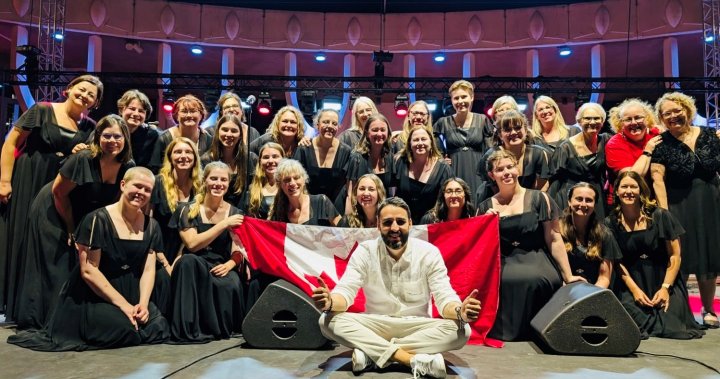As the spring sun cast a golden glow across the centuries-old stone architecture of Tours, France, a group of Edmonton women stood breathless, waiting for the announcement. Moments later, ecstatic cheers erupted among the members of Belle Canto as they were named Grand Prize winners at the prestigious Florilège Vocal de Tours international choir competition.
“We were absolutely stunned,” recalls Pam Tames, a soprano who has sung with the all-women ensemble for eight years. “When they called our name, there was this moment of disbelief before we all just started hugging each other and crying.”
The Edmonton-based choir, founded in 1997, traveled to France last month to compete against 11 other vocal ensembles from around the world. Not only did they capture the competition’s top honor, they also won the audience choice award—a testament to their ability to connect emotionally with listeners across cultural and language barriers.
Belle Canto‘s artistic director, Heather Bedford, attributes their success to the choir’s distinctive Canadian perspective. “We brought pieces that told stories of our northern landscape, of reconciliation, and of women’s experiences,” she explains from her Edmonton studio, still jet-lagged from the journey home. “These aren’t just songs to us—they’re expressions of who we are and where we come from.”
The winning program included compositions by Canadian Indigenous composer Andrew Balfour and arrangements of traditional Métis songs alongside classical European pieces. This thoughtful cultural fusion captivated both judges and audiences in the Loire Valley city, known for its rich musical heritage.
For choir member Jessica Campbell, the victory represents more than just musical excellence. “Most of us balance full-time careers, families, and other responsibilities. We rehearse once a week, usually after long workdays,” she says. “To achieve this level of recognition while maintaining that balance feels incredibly validating.”
The competition, established in 1972, has become one of Europe’s most respected choral events. According to festival organizers, this year’s jury sought performances that demonstrated not just technical precision but authentic emotion and cultural depth—qualities that ultimately set Belle Canto apart.
The choir’s journey to international acclaim wasn’t without challenges. Fundraising efforts included community concerts, silent auctions, and personal contributions from each member. Support from the Edmonton Arts Council helped offset some travel costs, but the financial commitment remained significant for many participants.
“There were moments in the past year when we wondered if we could make this happen,” admits Bedford. “But there’s something special about this group. We’ve been through so much together—the pandemic, personal losses, celebrations. That shared history creates a unique sound that resonates with audiences.”
The competition results have already generated new opportunities. Belle Canto has received invitations to perform at two European festivals next year and has seen increased interest in their upcoming Edmonton concert series.
For the city’s arts community, the win represents an important achievement. “Edmonton has always had an incredibly vibrant choral scene, but it often doesn’t get the recognition it deserves internationally,” notes David Wilson, executive director of Choir Alberta. “Belle Canto‘s success puts our musical excellence on the global map.”
The choir’s achievement also highlights the broader value of community arts groups. According to a 2023 Statistics Canada report, participation in performing arts organizations correlates with improved mental health outcomes and stronger community connections—benefits that extend well beyond the stage.
Back home in Edmonton, the choir members are still processing their victory while preparing for upcoming performances. Their spring concert at McDougall United Church is now being billed as a “victory celebration” featuring their award-winning program.
What makes Belle Canto‘s achievement particularly remarkable is the choir’s non-professional status. Unlike some competitors who rehearse daily or receive institutional funding, these Edmonton women create their art alongside busy professional and personal lives.
“We have teachers, nurses, engineers, scientists, and administrators,” explains founding member Maria Lennox. “Some drive over an hour each way for rehearsals. That dedication creates something special—we don’t take a single moment of music-making for granted.”
As the choir prepares for their homecoming concert, there’s a newfound confidence in their rehearsals. The international validation has changed something fundamental in how they approach their artistry.
“Before France, we believed in ourselves,” reflects Bedford, “but now we know with certainty that our voices matter on a global stage. That knowledge transforms how we sing, how we interpret the music, how we connect with each other.”
For Edmonton’s arts community and the choir members themselves, Belle Canto‘s victory represents something more profound than trophies or certificates. It stands as proof that authentic artistic expression, grounded in place and community, can resonate universally—whether in a northern Canadian city or an ancient French cathedral.






